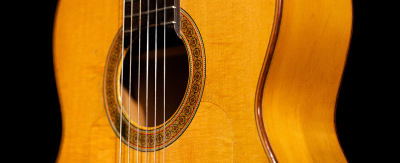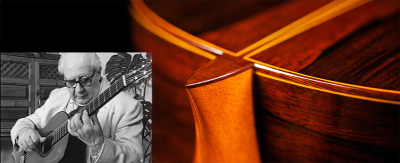Recording Artist: Narciso Yepes
Narciso Yepes was born in the open fields of Lorca, in the region of Murcia, on November 14th 1927, and he passed away in Murcia on May 3rd 1997.
Narciso grew up in Lorca, where he learned to reflect and meditate well in nature, and this made for an experience that he would cherish throughout his life. His potential to succeed professional fields where many others would was limited because of his po0r eye-sight; however, Narciso learned at an early age to make the most of everything he was involved in and to look deep into things, especially his own existence, with discerning wisdom.
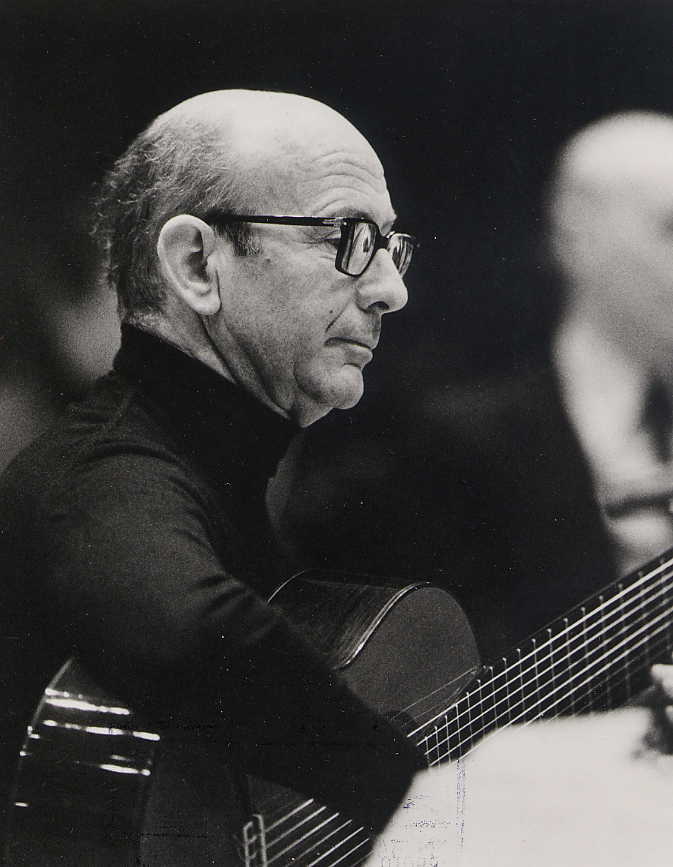 He savored the silence and cool wind of the city every time he would ride in by donkey on his way to school, where he’d learn to read music and words, of course. In later years, Narciso would ride into the city on his bike across the same streets during the summer’s heat and winter’s cold winds. At this very young age, he understood the value of one’s willpower and perseverance.
He savored the silence and cool wind of the city every time he would ride in by donkey on his way to school, where he’d learn to read music and words, of course. In later years, Narciso would ride into the city on his bike across the same streets during the summer’s heat and winter’s cold winds. At this very young age, he understood the value of one’s willpower and perseverance.
As a teen living in the city, he struggled financially, but he replaced his desire for expensive things with a very intense and disciplined attention, which allowed him to stretch time to fit in all of his passions. At age 15, he gave musical instruction to students much older than himself and by night he would study using books he’d borrow from friends. Narciso’s ability to concentrate fiercely along with his great memory, acquired through discipline, were what sealed his rigorous and creative performances that would come in the future.
Narciso Yepes earned only diplomas and titles that were most necessary for him to advance his career, and he did so with the highest grades and ranks possible. An autodidact, he learned at a young age to be well-rounded in diverse areas of study as well as to surround himself with people who knew how to make the most of their gifts, their creativity and natural facilities on the guitar.
Left alone, without pride or boastful tendencies, without support, but with great talent which he accepted as a miraculous gift, Narciso continued to grow and advance his career as a guitarist.
At a certain point, Narciso overcame challenging limitations regarding to guitar technique, limitations which were known the world over by players of his time, and instead he found loopholes and invented tricks that suited his style very well; he conjured to reality everything that he imagined as far as technique was concerned, with no fear of being criticized, nor fear of going against the grain of the rigid rules that had been established up to this point. To his technical creativity, Narciso added an ongoing search for tone that would meet perfection to his ear, tone that would match the content of pieces, the colorful mood of them, since he was always catering to the music that he played and gave him so much in return. Narciso approached his repertoire with a different angle of perception every day so that he could interpret it newly each time. This granted him confidence and peace during his performances, which transmitted onto his audiences, because he had played his pieces looking at them from different perspectives and learning them in entirely new ways for years.
Narciso worked with Vicente Asencio, George Enescu, Walter Gieseking and Nadia Boulanger throughout his career. Not only was he affiliated with scholars of the arts and sciences, but he made good friends with musicians, painters, sculptors, architects and writers. In fact, he made friends with anyone and everyone who was interested, like himself, in the natural beauties of life and in creating solidarity among all of mankind through the arts. Narciso searched for God’s fingerprint in every person he met and in everything that was kind and beautiful.
He was courageous, humble, non-imposing, but very engaged in music as his form of communication and he delved deeper and deeper over the years. Whatever may have been a barrier in the outside world for Narciso, it served as an experience for him to communicate passionately and emotionally through the guitar, just as a light turns off the darkness.
He chose a life of wisdom and his life became an uncompromised search for knowledge, from the most abstract of learnings to the everyday simplicities; he had an unquenchable thirst for the transcendental, and his goal was to serve the Creator who had given him this thirst.
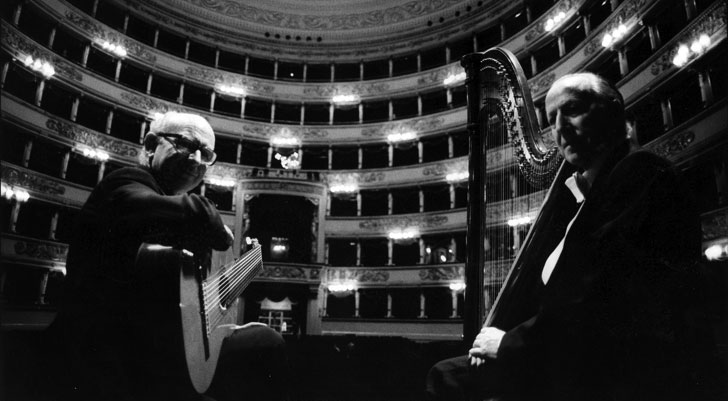
It was not enough for Narciso that the guitar had only six strings since he imagined it with more sonic and tonal options, much more sonic equilibrium, hence requesting that his famous 10-string guitar be made. It was a much more expressive instrument and one that appropriately handled early, Renaissance and Baroque music so that there was no need to tamper with original transcriptions.
Narciso Yepes performed beyond the Spanish borders within which he began his career, he was able to gain audiences across the globe in five different continents. Year after year he returned to the same continents and countries because his listeners wanted an encore. He played recitals and concerts in some of the most well-known halls today, playing alongside prestigious orchestras and for some of the most famous conductors. His 10-string guitar became widely-known, situated at the highest tier of classical music.
Many composers wrote works for him and in return, he interpreted such pieces with a vast imagination and great respect, giving them original life. Narciso was gifted enough to know what the composer wanted to hear and what he may have meant to compose as well as what the composer may not have known to translate into a work for the guitar. The 10-string guitarist went around these obstacles to make music a reality.
A natural pedagogue, Narciso passed on his best secrets with full effort to those who wanted to learn from him. He gave master classes wherever he’d visit on tours. And overall, beyond teaching the guitar, beyond music itself, he taught life lessons to his most receptive students by way of his example and his experiences.
Narciso was also an infatigable worker because he searched libraries all over the world for old, forgotten transcriptions of music that he’d later present in performances. He further enriched the guitar repertoire when he’d bring back to the surface TAB manuscripts for the lute.
This ongoing sense of honor and respect that he felt for his profession, produced the quality of musician that he was until his very last days.
As an innovator of guitar technique, unique interpreter of both known and new pieces, Narciso left an unforgettable mark in all of his recordings. He recorded over 50 albums, many of them with pieces that had been heard before but not in his way as he interpreted them with 10 strings, such as the Bach Lute Suites. And of course, he also recorded guitar conciertos dedicated specifically to him and unedited works, all of which were critically-acclaimed.
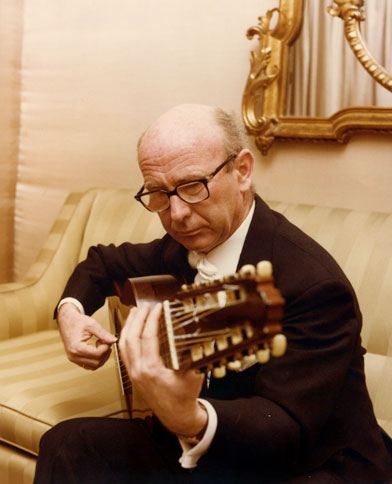 Narciso Yepes received high humanitarian honors. He was awarded the Primer Doctor Honoris en Filosofía from la Universidad de Murcia, an Académico award from la Academia de Alfonso X el Sabio, Académico elegido por unanimidad de la Academia from Bellas Artes de San Fernando and a Premio Nacional de Música – all of which he would always say he did not deserve but which he accepted to carry on using his gift to make music. The two awards that excited him the most were la Medalla de Oro al Mérito en las Bellas Artes, given to him by His Spanish Majesty the King D. Juan Carlos I, during its first year that the award was created, and his naming of Hermano Bienhechor de la Orden del Císter by the Abad General of the Cistercian Order.
Narciso Yepes received high humanitarian honors. He was awarded the Primer Doctor Honoris en Filosofía from la Universidad de Murcia, an Académico award from la Academia de Alfonso X el Sabio, Académico elegido por unanimidad de la Academia from Bellas Artes de San Fernando and a Premio Nacional de Música – all of which he would always say he did not deserve but which he accepted to carry on using his gift to make music. The two awards that excited him the most were la Medalla de Oro al Mérito en las Bellas Artes, given to him by His Spanish Majesty the King D. Juan Carlos I, during its first year that the award was created, and his naming of Hermano Bienhechor de la Orden del Císter by the Abad General of the Cistercian Order.
Narciso Yepes has made a lasting contribution to the world with this guitar. He once said, “la música es parte de la vida y la vida es movimiento” (“music is part of life and life is movement”). He knew that music had to be inspired by love.
He was loyal to his mission of communicating in a loving way through music, and his audiences knew this. My children and I [Marysia] have enjoyed a great peace in life knowing what Narciso has accomplished and that he did it while never losing sight of his purpose.
His legacy remains in tact. I live alongside his spirit and with the lifelong work he left behind. I feel like the Yepes family has a wonderful responsibility now to breed participants of music, musicians, and lovers of music in children, teens, adults and the elderly of the world.
– Marysia Szumlakowska de Yepes, wife of Nariciso Yepes
(English translation: Reyes Gonzalez)
2 comments


